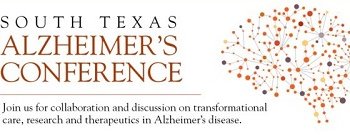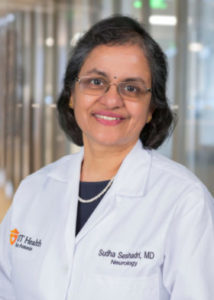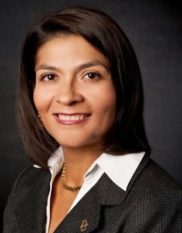UT Health San Antonio, in collaboration with the Alzheimer’s Association, The University of Texas Rio Grande Valley School of Medicine, The University of Texas at San Antonio and the Darrell K. Royal Research Fund for Alzheimer’s Disease, presents the first South Texas Alzheimer’s Conference Feb. 25 and 26 at the Wyndham Garden San Antonio Riverwalk Hotel.

The Glenn Biggs Institute for Alzheimer’s and Neurodegenerative Diseases at UT Health San Antonio is the conference organizer. The event registration has closed, but members of the news media are welcome to interview preeminent scientists about Alzheimer’s disease topics.
Alzheimer’s is on the rise, and Hispanics are at higher risk
According to the Alzheimer’s Association, deaths from Alzheimer’s disease, as recorded on death certificates between 2000 and 2015, increased 123 percent. Deaths from heart disease, the No. 1 cause of mortality, decreased 11 percent over the same span. Alzheimer’s is the only top 10 cause of death in the United States that cannot be prevented, cured or even slowed. (Source: www.alz.org)
On its opening day, the South Texas Alzheimer’s Conference will focus on the increased burden of dementia in Hispanic/Latino communities. Two in five Texans are Hispanic/Latino, and Hispanics/Latinos are about 1½ times as likely to have Alzheimer’s or other dementias as older whites, according to the Alzheimer’s Association.
The following day, Feb. 26, speakers will discuss scientific initiatives surrounding precision, personalized medicine. This is an effort to, in the future, better diagnose and more effectively care for each individual with dementia based on their own biomarkers of risk.

“The two themes are interlinked, because we understand dementia in Hispanics less than we do in other communities,” said Sudha Seshadri, M.D., professor of neurology at UT Health San Antonio and founding director of the Glenn Biggs Institute. “The risk is greater in Hispanics, and the cause is probably multiple factors, including our region’s high prevalence of diabetes as well as different genes that may be important in Hispanics. We will be bringing this all together with experts from across Texas, the country and the world.”
The Hispanic/Latino population of the U.S. is projected to more than double by 2050.
“Despite this, when you come to the drug trials and critical research that could prevent the disease, Hispanics are very under-represented,” Dr. Seshadri said.
The toll is immeasurable
Across the country, more than 5.7 million Americans live with Alzheimer’s or related dementia, said Mario Carrillo, Ph.D., chief science officer of the Alzheimer’s Association, who will speak at the research conference.

“Many times we don’t understand the burden, unless we experience it ourselves with a loved one,” Dr. Carrillo said recently on Texas Public Radio’s “The Source” program. “We don’t understand the toll that this disease takes, and we don’t understand there is support available, from the Alzheimer’s Association and other sources.”
Alzheimer’s disease meets the three-point criteria for identifying a public health issue: the burden is large, the impact is major and there are ways to intervene.
“It is a continuous decline that happens over the course of what could be anywhere from an average of seven to nine years to upward of 20 years,” Dr. Carrillo said. “The disability, the need for 24-hour care, the toll it takes on their loved ones and the care that is required are extraordinary, not only for the families but also for public health offices and institutions that families turn to for help.”
What science gleans today will change tomorrow
The conference is bringing together the top minds to explore today’s scientific state of affairs in Alzheimer’s and related dementias.
“We absolutely represent the hope that dementia can be prevented, and that people with dementia can have their disease slowed and their quality of life optimized,” Dr. Seshadri said. “That is why the Glenn Biggs Institute was established at UT Health San Antonio.”
Stay connected with UT Health San Antonio on Facebook, Twitter, LinkedIn, Instagram and YouTube.
The University of Texas Health Science Center at San Antonio, now called UT Health San Antonio®, is one of the country’s leading health sciences universities. With missions of teaching, research, healing and community engagement, its schools of medicine, nursing, dentistry, health professions and graduate biomedical sciences have produced 36,500 alumni who are leading change, advancing their fields and renewing hope for patients and their families throughout South Texas and the world. To learn about the many ways “We make lives better®,” visit www.uthscsa.edu.

